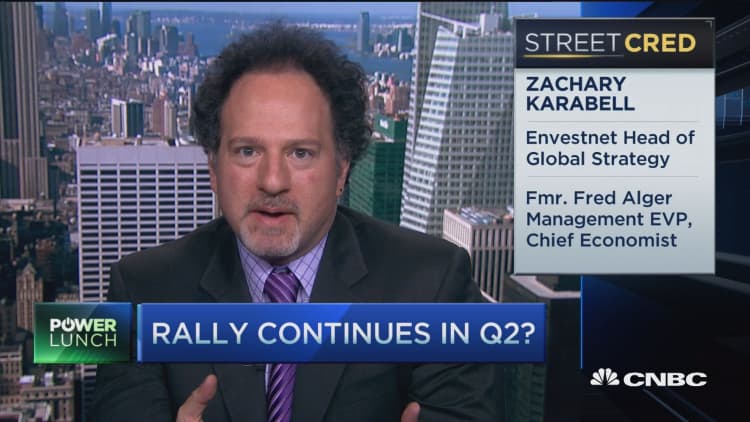
As the start of the second quarter nears, analysts have begun to classify market woes as either concerns or buying opportunities, but according to this strategist there's no need to panic.
Periods of intense volatility have been lasting three to four weeks for the past 15 months, and if the second quarter brings volatility such as the global sell-off at the beginning of the year, investors shouldn't jump the gun, according to Zachary Karabell, head of global strategy at Envestnet.
"Unless we find any fundamental deterioration, whether it's earnings, global macro, China, we're kind of in the market we've been in until otherwise notified," he said Thursday on "Power Lunch."
According to Thomson Reuters I/B/E/S, S&P 500 earnings are projected to drop nearly 7 percent year over year.
In contrast, Matthew Roddy, vice president and portfolio manager at Rockland Trust, thinks that earnings may beat analyst expectations in the next quarter.
"I think what we need to do is get through the first-quarter earnings through April," he said on "Power Lunch." "If [earnings are] good, I think we could hold these levels — and I do think they will be good."
Some market watchers argue, however, that uncertainty derived from China and volatility in the oil market remain a concern. But, oil has managed to bounce back and has traded slightly above $40 a barrel, Roddy said.
Meanwhile, the Standards & Poor's rating agency cut its credit rating outlook for China from stable to negative on Thursday. The firm cited increased economic weakness as a potential disadvantage for mainland China.
Still, Karabell told "Power Lunch" that these recurring economic issues are ongoing and will remain possibilities that aren't yet probable, he said, adding that earnings have also been a steady issue for the market.
"The last two to three quarters have been negative earnings or real depressed earnings," he said. "Earnings are a year-over-year comparison, and later in this year you're going to have very easy comparisons to surpass."
— CNBC's Katy Barnato and Dominic Chu contributed to this report.


